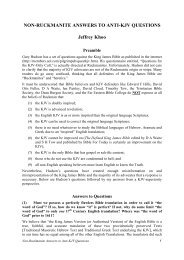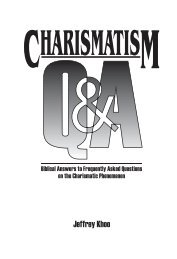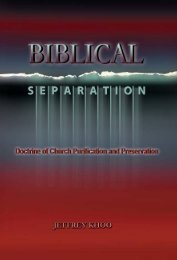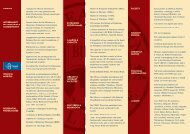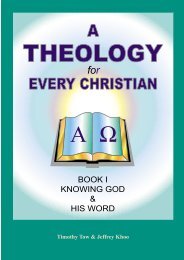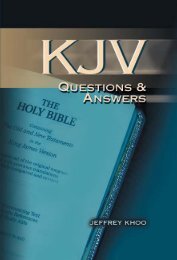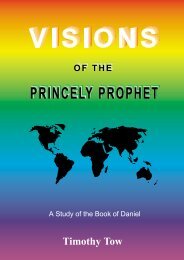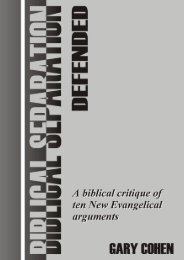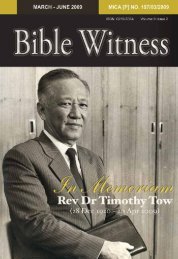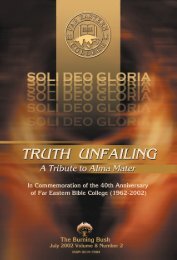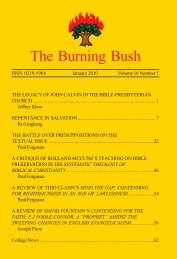50 Years Building His Kingdom - Far Eastern Bible College
50 Years Building His Kingdom - Far Eastern Bible College
50 Years Building His Kingdom - Far Eastern Bible College
You also want an ePaper? Increase the reach of your titles
YUMPU automatically turns print PDFs into web optimized ePapers that Google loves.
of Neo-evangelicalism is a case in point. The signing of the Evangelicals and<br />
Catholics Together document in 1994 is another. Overall, the NIV does not seem<br />
to have a good track record.<br />
d. It is claimed by some that the New King James Version (NKJV) is as good as the<br />
KJV, if not better than it, since it is also based on the Majority Text. Many of<br />
members of the committee for the NKJV were godly men. Among all the modern<br />
versions this is one that perhaps comes closest to the KJV. But there are also some<br />
serious deficiencies in the NKJV. The godly men in the committee had little control<br />
over how it finally turned out. They hoped to follow the KJV closely and just<br />
update the archaic words, but in the end it has unfortunately not just updated the<br />
archaic words but also altered many more words. (It has changed the KJV text in<br />
about 60,000 places) Some of the changed words were perfectly good terms in the<br />
KJV that should have remained unchanged. For example, the Comforter (Holy<br />
Spirit) in John 14:16, 26 and 15:26 and 16:7 has been changed to “the Helper”<br />
(following the NASV, and this is the same term used by Jehovah’s Witnesses).<br />
3. “We do employ the KJV alone as our primary scriptural text in the public reading,<br />
preaching and teaching of the English <strong>Bible</strong>.”<br />
a. Most of the elements of our church worship service are based on the KJV. How<br />
moving it is to hear our whole congregation saying the Lord’s prayer together<br />
with the words, “Our Father which art in heaven, hallowed be Thy name...” Any<br />
church that abandons the KJV for the NIV would have to end their Lord’s prayer<br />
without the words “For thine is the kingdom, and the power, and the glory, for<br />
ever. Amen” if they want to be consistent with their text! If we were to remove the<br />
KJV from our worship service many words and phrases in our worship would<br />
gradually lose their significance. For example, the “Holy Ghost” which we mention<br />
when we sing our Gloria Patri and Doxology would become obscure to those<br />
who use modern versions which do not have this term at all. Besides this, the<br />
lyrics of many of our best-loved hymns and old-time gospel choruses follow the<br />
KJV. For example,“Great is Thy Faithfulness” which is based on Lamentations<br />
3:22-23.<br />
b. Some dislike the KJV on the grounds that its English belongs to the 17th century<br />
and is archaic. Those who have studied literature would know that Shakespeare’s<br />
English is even more difficult to understand than KJV English. In almost any<br />
thick book there is always bound to be some words that the reader will not know.<br />
The KJV is the same. In most cases, the surrounding context of a word will give a<br />
good idea of what it means to the reader, who needs only to make the extra effort<br />
to learn and explain some of the old English words in the KJV. For example,<br />
“froward” means “wayward”, “usury” means “interest”.<br />
4. “We do consider as unreliable all <strong>Bible</strong> versions (eg. The New International Version<br />
or NIV) that modify or change the meaning of the original text or interpret it, instead<br />
of giving a literal and accurate translation.”<br />
a. The KJV translators adhered to the “formal equivalence” or “verbal equivalence”<br />
method of translation. This means that they followed the text very closely<br />
and did not modify or change the meaning. They took no liberties with God’s<br />
Word, and only rephrased certain expressions, when changes were really necessary.<br />
The KJV reading may sometimes be hard to understand but that is only<br />
because it has given a literal translation of the wording of the Greek or Hebrew<br />
text. And the wording of the original text of a particular verse may itself be difficult<br />
to understand and may be interpreted in several ways as commentaries on<br />
that verse will show. Modern translators overcome the difficulty by interpreting<br />
the verses for the reader. But this totally obscures all other possible ways of interpreting<br />
them. What we read then may not be God’s Word any more but what some<br />
people think it means.<br />
Page 67




